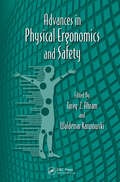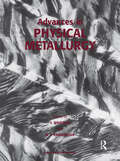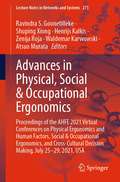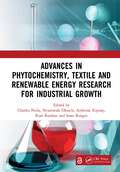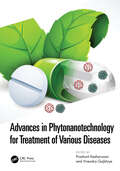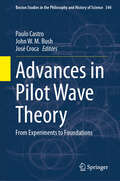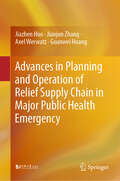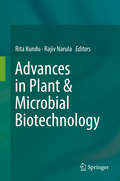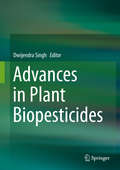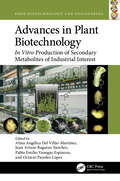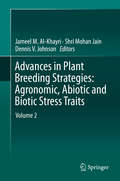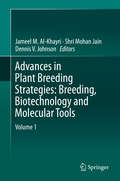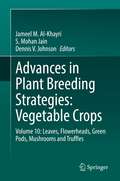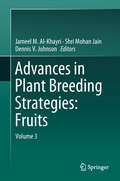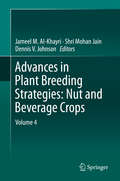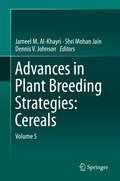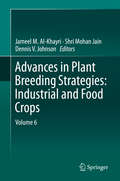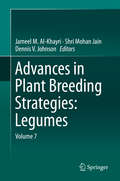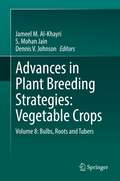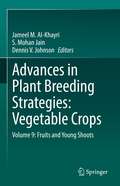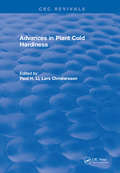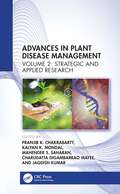- Table View
- List View
Advances in Physical Ergonomics and Human Factors: Proceedings of the AHFE 2017 International Conference on Physical Ergonomics and Human Factors, July 17-21, 2017, The Westin Bonaventure Hotel, Los Angeles, California, USA (Advances in Intelligent Systems and Computing #602)
by Waldemar Karwowski Ravindra S. GoonetillekeThis book reports on the state of the art in physical ergonomics and is concerned with the design of products, process, services, and work systems to assure their productive, safe, and satisfying use by people. With focus on the human body's responses to physical and physiological work demands, repetitive strain injuries from repetition, vibration, force, and posture are the most common types of issues examined, along with their design implications. The book explores a wide range of topics in physical ergonomics, which includes the consequences of repetitive motion, materials handling, workplace safety, and usability in the use of portable devices, design, working postures, and the work environment. Mastering physical ergonomics and safety engineering concepts is fundamental to the creation of products and systems that people are able to use, as well as the avoidance of stresses and minimization of the risk of accidents. Based on the AHFE 2016 International Conference on Physical Ergonomics & Human Factors, held on July 27-31, 2016 in Walt Disney World#65533;, Florida, USA, the book provides readers with a comprehensive view of the current challenges in Physical Ergonomics, which are a critical aspect in the design of any human-centered technological system, and factors influencing human performance.
Advances in Physical Ergonomics and Safety (Advances in Human Factors and Ergonomics Series)
by Waldemar Karwowski Tareq Z. AhramBased on recent research, this book discusses physical ergonomics, which is concerned with human anatomical, anthropometric, physiological and biomechanical characteristics as they relate to physical activity. Topics include working postures, materials handling, repetitive movements, work-related musculoskeletal disorders, workplace layout, safety,
Advances in Physical Metallurgy
by Anirban BanerjeeThis volume focuses on the wealth of existing literature on physical metallurgy, and deals with materials in different states of order and the process of order evolution. It is a valuable reference by students and researchers in the field of materials science and metallurgy.
Advances in Physical, Social & Occupational Ergonomics: Proceedings of the AHFE 2020 Virtual Conferences on Physical Ergonomics and Human Factors, Social & Occupational Ergonomics and Cross-Cultural Decision Making, July 16–20, 2020, USA (Advances in Intelligent Systems and Computing #1215)
by Waldemar Karwowski Richard H. M. Goossens Ravindra S. Goonetilleke Atsuo Murata Shuping XiongThis book reports on cutting-edge findings and developments in physical, social and occupational ergonomics. It covers a broad spectrum of studies and evaluation procedures concerning physical and mental workload, work posture and ergonomic risk. Further, it reports on significant advances in the design of services and systems, including those addressing special populations, for purposes such as health, safety and education, and discusses solutions for a better and safer integration of humans, automated systems and digital technologies. The book also analyzes the impact of culture on people’s cognition and behavior, providing readers with timely insights into theories on cross-cultural decision-making, and their diverse applications for a number of purposes in businesses and societies. Based on three AHFE 2020 conferences (the AHFE 2020 Virtual Conference on Physical Ergonomics and Human Factors, the AHFE 2020 Virtual Conference on Social & Occupational Ergonomics, and the AHFE 2020 Virtual Conference on Cross-Cultural Decision Making), it provides readers with a comprehensive overview of the current challenges in physical, social and occupational ergonomics, including those imposed by technological developments, highlights key connections between them, and puts forward optimization strategies for sociotechnical systems, including their organizational structures, policies and processes.
Advances in Physical, Social & Occupational Ergonomics: Proceedings of the AHFE 2021 Virtual Conferences on Physical Ergonomics and Human Factors, Social & Occupational Ergonomics, and Cross-Cultural Decision Making, July 25-29, 2021, USA (Lecture Notes in Networks and Systems #273)
by Waldemar Karwowski Ravindra S. Goonetilleke Atsuo Murata Shuping Xiong Henrijs Kalkis Zenija RojaThis book reports on cutting-edge findings and developments in physical, social and occupational ergonomics. It covers a broad spectrum of studies and evaluation procedures concerning physical and mental workload, work posture and ergonomic risk. Further, it reports on significant advances in the design of services and systems, including those addressing special populations, for purposes such as health, safety and education, and discusses solutions for a better and safer integration of humans, automated systems and digital technologies. The book also analyzes the impact of culture on people’s cognition and behavior, providing readers with timely insights into theories on cross-cultural decision-making, and their diverse applications for a number of purposes in businesses and societies. Based on the AHFE 2021 conferences on Physical Ergonomics and Human Factors, Social & Occupational Ergonomics, and Cross-Cultural Decision Making, held virtually on 25–29 July, 2021, from USA, it provides readers with a comprehensive overview of the current challenges in physical, social and occupational ergonomics, including those imposed by technological developments, highlights key connections between them, and puts forward optimization strategies for sociotechnical systems, including their organizational structures, policies and processes.
Advances in Physiological Computing (Human–Computer Interaction Series)
by Stephen H. Fairclough Kiel GilleadeThis edited collection will provide an overview of the field of physiological computing, i. e. the use of physiological signals as input for computer control. It will cover a breadth of current research, from brain-computer interfaces to telemedicine.
Advances in Phytochemistry, Textile and Renewable Energy Research for Industrial Growth: Proceedings of the International Conference of Phytochemistry, Textile and Renewable Energy for Sustainable development (ICPTRE 2020), August 12-14, Eldoret, Kenya
by Dr Charles NzilaThe International Conference on Phytochemistry, Textile, & Renewable Energy Technologies for Sustainable Development (ICPTRE 2020) was hosted by the World bank funded Africa Centre of Excellence in Phytochemicals, Textile and Renewable Energy (ACEII-PTRE) based at Moi University in conjunction with Donghua University, China and the Sino–Africa International Symposium on Textiles and Apparel (SAISTA). The theme of the conference was Advancing Science, Technology and Innovation for Industrial Growth. The research relationships between universities and industry have enabled the two entities to flourish and, in the past, have been credited for accelerated sustainable development and uplifting of millions out poverty. ICPTRE 2020 therefore provided a platform for academic researchers drawn from across the world to meet key industry professionals and actively share knowledge while advancing the role of research in industrial development, particularly, in the developing nations. The conference also provided exhibitors with an opportunity to interact with professionals and showcase their business, products, technologies and equipment. During the course of the conference, industrial exhibitions, research papers and presentations in the fields of phytochemistry, textiles, renewable energy, industry, science, technology, innovations and much more were presented.
Advances in Phytonanotechnology for Treatment of Various Diseases
by Prashant Kesharwani Virendra GajbhiyeSeveral plant bioactives or plant-derived therapeutic molecules have been used against life-threatening diseases and their nanoparticle-mediated delivery greatly improves therapeutic efficacy. Advances in Phytonanotechnology for Treatment of Various Diseases aims to describe past and recent advances achieved in the field of phytonanotechnology. The chapters of this book provide thorough knowledge of medicinal plants, plant bioactives, plant extract-based nanoparticle synthesis, delivery of plant bioactives through nanoparticles, and their therapeutic activity against life-threatening diseases. This book focuses on the therapeutic activity of phytocomponents present in plants from diverse families, genera, and species. The book also covers future aspects and challenges present in phytonanotechnology for curing human diseases. This book fulfils the thrust of researchers working in this field, which further encourages them to make new discoveries in this area and support the development of effective nanoparticle-mediated plant bioactive delivery platforms for treating human diseases. Key Features Provides information on medicinal plants and plant bioactives used in the treatment of various life-threatening diseases Covers green synthesis of nanoparticles as well as their toxicological and biological effects Explores various nanocarriers routinely used in the delivery of plant bioactives and their efficacy for future drug delivery Envisages future opportunities, challenges, and implementation made in phytonanotechnology-based treatment of human diseases
Advances in Pilot Wave Theory: From Experiments to Foundations (Boston Studies in the Philosophy and History of Science #344)
by Paulo Castro John W. M. Bush José CrocaThis book provides a state-of-the-art review of Pilot Wave Theory at the beginning of the XXI century. It contains the best contributions of the first International Conference on Advances in Pilot Wave Theory, held in Lisbon in 2021. The event brought together physicists from the new emerging field of Hydrodynamic Quantum Analogs (HQA) and philosophers of science. Three main themes were discussed: 1. Hydrodynamic quantum analogs, 2. Theoretical advances in pilot wave physics and, 3. Philosophical foundations of pilot wave theory. Recent experimental work in HQA has provided impetus to develop the pilot-wave approach into a realistic basis of quantum mechanics, specifically a dynamical completion of the existing theory of quantum statistics. To that end, the meeting featured theoretical work that advanced Louis de Broglie original pilot wave theory. This collection shows how several aspects of quantum systems have been reproduced in the hydrodynamic environment, and how the power of analogy suggests the possibility of a relatively intelligible quantum realm. Most notably, the notion of memory, as engendered in the pilot-wave-hydrodynamic system, suggests a profitable direction to explore in developing a more complete description of quantum phenomena. This book is expected to be of great interest to physicists, computer scientists and philosophers of science interested in the foundations of Quantum Mechanics. Chapter 1 and Chapter 12 are available open access under a Creative Commons Attribution 4.0 International License via link.springer.com.
Advances in Planning and Operation of Relief Supply Chain in Major Public Health Emergency
by Jianjun Zhang Jiazhen Huo Axel Werwatz Guanwei HuangWith Operations Research and System Dynamics as research tools, this book discusses the theme of emergency supplies in Major Public Health Emergency (MPHE) scenarios. The subject includes a series of new issues: critical criteria matching supply with demand for emergency supplies in MPHE, emergency medical materials reserve mode, dynamic optimization of emergency logistics, dynamic optimization of allocating multi-period and multi-category emergency supplies, etc. This book is suitable for university teachers, undergraduate and graduate students, and researchers in fields of logistics and supply chain management as well as emergency management. The most important features of this book include: Firstly, to achieve fairness and accuracy of material distribution during the epidemic, this book constructs a material shortage adjustment function. Secondly, from the comprehensive perspective of cross-regional coordination, multi-organization coordination and multiperiod coordination, the operation optimization models of emergency material supply in major epidemic situation are constructed. Additionally, the comparative analysis and empirical research of the practices in China and Germany also reflects the novelty and benefit of the book.
Advances in Plant & Microbial Biotechnology
by Rita Kundu Rajiv NarulaBiotechnology refers to the use or manipulation of an organism or parts of an organism. While the early applications were certainly simpler (though still relevant), modern plant biotechnology is primarily associated with molecular biology, cloning and genetic engineering. Over the last 50 years, several key discoveries have revolutionized the biological sciences and enabled the rapid growth of the biotechnology industry.This book gathers handpicked articles presented by national and international scientists at the International Conference on Biotechnology and Biological Sciences, BIOSPECTRUM 2017. It highlights the works of researchers and students in India and abroad on plant biotechnology and its applications in addressing various agricultural and food production-related issues.The respective papers explore a range of advances in plant biotechnology, e.g.: the cytotoxic potential of Moringaoleifera lam; the use of the entomo-pathogenic fungi Cordyceps sp. as unique and valuable sources of bioactive compounds; and strain improvement strategies for Cordyceps sp. In addition, they discuss the use of low-cost blue green algal biofertilizer comprising four blue green algal strains in rice fields; and the use of lignocellulosic materials as potential renewable energy resources for the production of fuels.This book will be extremely useful for researchers and students of biotechnology and plant science, providing an essential update on the latest findings and trends.
Advances in Plant Biopesticides
by Dwijendra SinghThe 'Advances in Plant Biopesticides' comprises 19 chapters on different important issues of developing biopesticides from promising botanicals and its phytomolecules based on the research reviews in the area concern. The book is written by reputed scientists and professors of both developed and developing countries namely Australia, Canada, Czech Republic, Egypt, Greece, India, Kenya, Thailand, Turkey, United Kingdom, and USA represented by almost 53 contributors. The book is organized and presented in such a form that the readers can acquire and enhance their knowledge in plant biopesticide bioresources, its application in different areas to manage pests and diseases of field crops, stored products with status of exploring in Africa, non-target effects on beneficial arthropods, control of arthropods of veterinary and vectors of communicable diseases, efficacy in controlling honeybee mite pests, prospect of applying new tools to enhance the efficacy of plant biopesticides through use of nanotechnology, most important plant derived active principle as source of biopesticides, possible mode of action of phytochemicals against arthropods, limitation, production status, consumption, formulation, registration and quality regulation of plant biopesticides and have been cited by important scientific references. Most importantly, the book also highlights a unique example for developing biopesticides based on the research on Annonaceae as potential source of plant biopesticide, exploiting phytochemicals for developing green technology for sustainable crop protection strategies to withstand climate change with example in Africa, and overview in developing insect resistance to plant biopesticides. Most of the chapter contributing authors are internationally reputed researchers and possess experiences of more than three to four decades in the area of plant biopesticides. The contributing and corresponding authors of the book - Advances in Plant Biopesticides proposed and identified by the editor (Dwijendra Singh) include distinguished professors and reputed scientists from different continents of the world namely MB Isman (Canada), Nadia Z Dimetry (Egypt), Zeaur R Khan (Kenya), John A Pickett (UK), Gadi VP Reddy (USA), S Gopalakrishnan (India), Anand Prakash (India), Chirantan Chattopadyay (India), Christos G Athanassiou (Greece), Philip C. Stevenson (UK), S Raguraman (India), S Ghosh (India), Mir S Mulla (USA), Apiwat Tawatsin (Thailand), Dwijendra Singh (India), K Sahayaraj (India), Suresh Walia (India), T Shivanandappa (India), Roman Pavela (Czeck Republic), Errol Hasan (Australia), Ayhan Gokce (Turkey), SK Raza (India), and their colleague co-contributors. This book would certainly provide the updated knowledge to global readers on plant biopesticides as one of the important reference source and would stimulate to present and future researchers, scientists, student, teachers, entrepreneurs, and government & non-government policy makers interested to develop new & novel environmentally safe plant biopesticides world over.
Advances in Plant Biotechnology: In Vitro Production of Secondary Metabolites of Industrial Interest (Food Biotechnology and Engineering)
by Alma Angélica Del Villar-Martínez, Juan Arturo Ragazzo-Sánchez, Pablo Emilio Vanegas-Espinoza, and Octavio Paredes-LópezThe goal of Advances in Plant Biotechnology is to integrate the most recent knowledge on tissue culture, secondary metabolites production under controlled conditions, scaling up to produce them at bioreactor level, and their industrial applications. The biosynthetic pathways and the factors that affect them and the accumulation of metabolites, including metabolomics in medicinal plants, are key components as well. Several extraction and encapsulation technological procedures are reviewed. The structure and function of metabolites from selected commercial crops are reported in detail. Finally, items of paramount importance, such as bioavailability and stability of metabolites in pharma and food products are deeply analyzed.Key Features: Strategies for obtaining selected metabolites through in vitro culture Application of biotechnological and bioengineering principles to the management of plant metabolites Description of the encapsulation of selected metabolites Bioavailability and stability of metabolites in pharma, food, and industrial sectors This book is mainly addressed to research scientists, technical staff, and private and public organizations involved in plant biotechnology and in its processing industries. Last, but not least, students at all levels and postdoctoral researchers have received special attention from all editors and authors in this publication.
Advances in Plant Breeding Strategies: Agronomic, Abiotic and Biotic Stress Traits
by Shri Mohan Jain Jameel M. Al-Khayri Dennis V. JohnsonThe basic concept of this book is to examine the use of innovative methods augmenting traditional plant breeding towards the development of new crop varieties under different environmental conditions to achieve sustainable food production. This book consists of two volumes: Volume 1 subtitled Breeding, Biotechnology and Molecular Tools and Volume 2 subtitled Agronomic, Abiotic and Biotic Stress Traits. This is volume 2 which contains 18 chapters highlighting breeding strategies for specific plant traits including improved nutritional and pharmaceutical properties as well as enhanced tolerance to insects, diseases, drought, salinity and temperature extremes expected under predicted global climate change.
Advances in Plant Breeding Strategies: Breeding, Biotechnology and Molecular Tools
by Shri Mohan Jain Jameel M. Al-Khayri Dennis V. JohnsonThe basic concept of this book is to examine the use of innovative methods augmenting traditional plant breeding towards the development of new crop varieties under different environmental conditions to achieve sustainable food production. This book consists of two volumes: Volume 1 subtitled Breeding, Biotechnology and Molecular Tools and Volume 2 subtitled Agronomic, Abiotic and Biotic Stress Traits. This is Volume 1 which consists of 21 chapters covering domestication and germplasm utilization, conventional breeding techniques and the role of biotechnology. In addition to various biotechnological applications in plant breeding, it includes functional genomics, mutations and methods of detection, and molecular markers. In vitro techniques and their applications in plant breeding are discussed with an emphasis on embryo rescue, somatic cell hybridization and somaclonal variation. Other chapters cover haploid breeding, transgenics, cryogenics and bioinformatics.
Advances in Plant Breeding Strategies: Volume 10: Leaves, Flowerheads, Green Pods, Mushrooms and Truffles
by S. Mohan Jain Jameel M. Al-Khayri Dennis V. JohnsonPlant breeders and geneticists are under constant pressure to sustain and expand food production by using innovative breeding strategies and introducing minor crops, which are well adapted to marginal lands, provide a source of nutrition, and have abiotic and biotic stress tolerance, to feed an ever-increasing human population. The basic concept of this book is to examine the use of innovative methods, augmenting traditional plant breeding, towards the improvement and development of new crop varieties, under the increasingly limiting environmental and cultivation factors, to achieve sustainable agricultural production and enhanced food security. Three volumes of the book series Advances in Plant Breeding Strategies were published in 2015, 2016 and 2018, respectively: Volume 1. Breeding, Biotechnology and Molecular Tools; Volume 2. Agronomic, Abiotic and Biotic Stress Traits and Volume 3. Fruits. In 2019, the following four volumes were published: Volume 4. Nut and Beverage Crops, Volume 5. Cereals, Volume 6. Industrial and Food Crops and Volume 7. Legumes. In 2021, three volumes are being concurrently published: Volume 8. Vegetable Crops: Bulbs, Roots and Tubers, Volume 9. Vegetable Crops: Fruits and Young Shoots and Volume 10. Vegetable Crops: Leaves, Flowerheads, Green Pods, Mushrooms and Truffles. This Volume 10, subtitled Vegetable Crops: Leaves, Flowerheads, Green Pods, Mushrooms and Truffles, consists of 14 chapters focusing on advances in breeding strategies using both traditional and modern approaches for the improvement of individual vegetable crops. Chapters are arranged in 4 parts according to the edible vegetable parts. Part I: Leaves - Chicory (Cichorium intybus L.), Chinese cabbage (Brassica rapa L. var. pekinensis), Rocket salad (Eruca vesicaria ssp. sativa Mill.), Spring onion (Allium fistulosum L.),Water spinach (Ipomoea aquatica Forsk.) and Watercress (Nasturtium officinale R. Br.); Pat II: Flowerheads and Green Pods - Cauliflower (Brassica oleracea var. botrytis L.), Globe artichoke (Cynara cardunculus var. scolymus L.), Garden pea (Pisum sativum L.) and Yardlong bean (Vigna unguiculata (L.) Walp. ssp. sesquipedalis (L.) Verdc.); Part III: Mushrooms - Enoki mushroom (Flammulina velutipes (Curtis) Singer) and Shiitake mushroom (Lentinula edodes (Berk.) Sing.); Part IV: Truffles - Desert truffles (Terfezia spp.) and White truffle (Tuber magnatum Picco and T. borchii Vittad.). Each chapter comprehensively reviews the contemporary literature on the subject and reflects the experiences of the authors. Chapters are written by internationally-reputable scientists and subjected to a review process to assure quality presentation and scientific accuracy. Each chapter begins with an introduction covering related backgrounds and provides in-depth discussion of the subject supported with high-quality color photos, illustrations and relevant data. The chapter concludes with recommendations for future research directions, a comprehensive list of pertinent references to facilitate further reading, and appendixes of genetic resources and concerned research institutes. This book series is a valuable resource for advanced students, researchers, scientists, commercial producers and seed companies as well as consultants and policymakers interested in agriculture, particularly in modern breeding technologies.
Advances in Plant Breeding Strategies: Volume 3
by Shri Mohan Jain Jameel M. Al-Khayri Dennis V. JohnsonThis book examines the development of innovative modern methodologies towards augmenting conventional plant breeding for the production of new crop varieties, under the increasingly limiting environmental and cultivation factors, to achieve sustainable agricultural production and enhanced food security. Two volumes of Advances in Plant Breeding Strategies were published in 2015 and 2016, respectively; Volume 1: Breeding, Biotechnology and Molecular Tools and Volume 2: Agronomic, Abiotic and Biotic Stress Traits. This is Volume 3: Fruits, which is focused on advances in breeding strategies for the improvement of individual fruit crops. It consists of 23 chapters grouped into three parts, according to distribution classification of fruit trees: Part I, Temperate Fruits, Part II, Subtropical Fruits, and Part III, Tropical Fruits. Each chapter comprehensively reviews the modern literature on the subject and reflects the authors' own experience.
Advances in Plant Breeding Strategies: Volume 4
by Shri Mohan Jain Jameel M. Al-Khayri Dennis V. JohnsonThis book examines the development of innovative modern methodologies towards augmenting conventional plant breeding, in individual crops, for the production of new crop varieties under the increasingly limiting environmental and cultivation factors to achieve sustainable agricultural production, enhanced food security, in addition to providing raw materials for innovative industrial products and pharmaceuticals. This Volume 4, subtitled Nut and Beverage Crops, focuses on advances in breeding strategies using both traditional and modern approaches for the improvement of individual plantation crops. Included in Part I, eleven important nut species recognized for their economical and nutritional importance including Almond, Argan, Brazil nut, Cashew nut, Chestnut, Hazelnut, Macadamia, Peanut, Pine nut, Pistachio and Walnut. Part II covers two popular beverage species, coffee and tea. This volume is contributed by 53 internationally reputable scientists from 13 countries. Each chapter comprehensively reviews the modern literature on the subject and reflects the authors own experience.
Advances in Plant Breeding Strategies: Volume 5
by Shri Mohan Jain Jameel M. Al-Khayri Dennis V. JohnsonThis book examines the development of innovative modern methodologies towards augmenting conventional plant breeding, in individual crops, for the production of new crop varieties under the increasingly limiting environmental and cultivation factors to achieve sustainable agricultural production, enhanced food security, in addition to providing raw materials for innovative industrial products and pharmaceuticals. This Volume 5, subtitled Cereals, focuses on advances in breeding strategies using both traditional and modern approaches for the improvement of individual crops. It addresses important staple food crops including barley, fonio, finger millet, foxtail millet, pearl millet, proso millet, quinoa, rice, rye, tef, triticale and spelt wheat. The volume is contributed by 53 internationally reputable scientists from 14 countries. Each chapter comprehensively reviews the modern literature on the subject and reflects the authors own experience.
Advances in Plant Breeding Strategies: Volume 6
by Shri Mohan Jain Jameel M. Al-Khayri Dennis V. JohnsonThis book examines the development of innovative modern methodologies towards augmenting conventional plant breeding, in individual crops, for the production of new crop varieties under the increasingly limiting environmental and cultivation factors to achieve sustainable agricultural production, enhanced food security, in addition to providing raw materials for innovative industrial products and pharmaceuticals. This is Vol 6, subtitled Industrial and Food Crops, which consists of two parts. Included in Part I are 11 industrial plant species utilized as sources of raw materials for the production of industrial products including pulp and wood crops (acacia), fiber (cotton, jute and ramie), rubber (guayule and rubber tree), oil (jojoba and flax), biofuels and pharmaceutical (agave) and sugar source (sugarcane). Part II covers 7 food plants selected for their utilization in food industries for the production of chocolate (cacao), cooking oil (oil palm, safflower, sesame and sunflower) and natural flavors and aroma (saffron and vanilla). This volume is contributed by 60 internationally reputable scientists from 14 countries. Each chapter comprehensively reviews the modern literature on the subject and reflects the authors own experience.
Advances in Plant Breeding Strategies: Volume 7
by Shri Mohan Jain Jameel M. Al-Khayri Dennis V. JohnsonThis book examines the development of innovative modern methodologies towards augmenting conventional plant breeding, in individual crops, for the production of new crop varieties under the increasingly limiting environmental and cultivation factors to achieve sustainable agricultural production, enhanced food security, in addition to providing raw materials for innovative industrial products and pharmaceuticals. This is Vol 7, subtitled Legumes, focuses on advances in breeding strategies using both traditional and modern approaches for the improvement of individual legume crops. Included in this volume are Adzuki bean, Black gram, Chickpea Cluster bean, Common bean, Cowpea, Faba bean, Hyacinth bean, Lentil, Mung bean, Pigeonpea and Soybean. This volume is contributed by 57 internationally reputable scientists from 9 countries. Each chapter comprehensively reviews the modern literature on the subject and reflects the authors own experience.
Advances in Plant Breeding Strategies: Volume 8: Bulbs, Roots and Tubers
by S. Mohan Jain Jameel M. Al-Khayri Dennis V. JohnsonThis book examines the development of innovative modern methodologies towards augmenting conventional plant breeding, in individual crops, for the production of new crop varieties under the increasingly limiting environmental and cultivation factors to achieve sustainable agricultural production, enhanced food security, in addition to providing raw materials for innovative industrial products and pharmaceuticals. This Volume 8, subtitled Vegetable Crops: Bulbs, Roots and Tubers, consists of 12 chapters focusing on advances in breeding strategies using both traditional and modern approaches for the improvement of individual vegetable crops. Chapters are arranged in 3 parts according to the edible vegetable parts. Part I: Bulbs - Garlic (Allium sativum L.), Leek (Allium ampeloprasum L.) and Shallot (Allium cepa L. Aggregatum group); Part II: Roots - Beetroot (Beta vulgaris ssp. vulgaris var. conditiva Alefeld), Carrot (Daucus carota L.), Parsnip (Pastinaca sativa L.), Radish (Raphanus sativus L.), Sugar beet (Beta vulgaris ssp. vulgaris L.) and Turnip (Brassica rapa var. rapa L.), Part III: Tubers - Potato (Solanum tuberosum L.) and Sweet potato (Ipomea batatas L.). The chapters were contributed by 38 internationally reputable scientists from 13 countries. Each chapter comprehensively reviews the modern literature on the subject and reflects the authors own experience.
Advances in Plant Breeding Strategies: Volume 9: Fruits and Young Shoots
by S. Mohan Jain Jameel M. Al-Khayri Dennis V. JohnsonThis book examines the development of innovative modern methodologies towards augmenting conventional plant breeding, in individual crops, for the production of new crop varieties under the increasingly limiting environmental and cultivation factors to achieve sustainable agricultural production, enhanced food security, in addition to providing raw materials for innovative industrial products and pharmaceuticals. This Volume 9, subtitled Vegetable Crops: Fruits and Young Shoots, consists of 12 chapters focusing on advances in breeding strategies using both traditional and modern approaches for the improvement of individual vegetable crops. Chapters are arranged in 2 parts according to the edible vegetable parts. Part I: Fruits - Bell Pepper (Capsicum annuum L. var. grossum Sendt.), Chili pepper (Capsicum frutescens L.), Bitter gourd (Momordica charantia L.), Bottle gourd (Lagenaria siceraria (Molina) Standl.), Eggplant (Solanum spp.), Okra (Abelmoschus esculentus L.), Plantain (Musa paradisiaca L.), Sweet gourd (Cucurbita moschata Duch. ex Poir.), Melon (Cucumis melo L. Groups Dudaim and Flexuosus), Tomato (Solanum lycopersicum L.) and Zucchini (Cucurbita pepo L.) and Part II: Young shoots - Asparagus (Asparagus officinalis L.). The chapters were contributed by 43 internationally reputable scientists from 11 countries. Each chapter comprehensively reviews the modern literature on the subject and reflects the authors own experience.
Advances in Plant Cold Hardiness
by Paul H. LiAdvances in Plant Cold Hardiness provides a detailed, up-to-date discussion of plant cold hardiness research. The molecular mechanisms of plant cold hardiness development, a subject not covered in any other low temperature stress book, is examined in depth. Other major topics addressed include the freezing tolerance and injury of plant tissues in vivo and in vitro, in addition to how research findings impact agricultural applications. The articles featured in Advances in Plant Cold Hardiness were presented as key papers at the 4th International Plant Cold Hardiness Seminar held at the Swedish University of Agricultural Sciences in Uppsala in July, 1991. The book will appeal to all researchers, students, and instructors in plant biology, agriculture, and forestry.
Advances in Plant Disease Management Volume II: Strategic and Applied Research
by Pranjib K. Chakrabarty Kalyan K. Mondal Mahender S. Saharan Charudatta Digambarrao Mayee Jagdish KumarAdvances in Plant Disease Management: Volume II: Strategic and Applied Research is an invaluable compilation for researchers/students/stakeholders/policymakers in agriculture. This book aims to offer the latest understanding of how fundamental and basic research can be translated toward the engineering of biotic stress-resilient crops through applied and strategic management of plant diseases. Volume I clearly explained the updated knowledge on basic and applied phenomena of pathogen’s interplay with the host, the host immune system, crosstalks among downstream regulating molecules as unraveled through genomics, proteomics, metabolomics, bioinformatics, and molecular studies. This volume of the book equips readers with the knowledge and understanding to confidently employ this basic information in the formulation of management strategies for major crop plant diseases.This book offers comprehensive coverage of the research advances in plant disease management, including: Newer insight into pest risk analysis (PRA) and its significance in international trade. Developments in eco-friendly green technologies that are safe for both humans and the environment to manage diseases. Use of AI tools for diagnosis, development of models for advanced prediction of the outbreak of epidemics, and need-based application of agrochemicals and their appropriate formulations for use through drones. The information regulation and use of biostimulants for biotic and abiotic resilience. Plant protection policies that support the agricultural production system from a global perspective.

